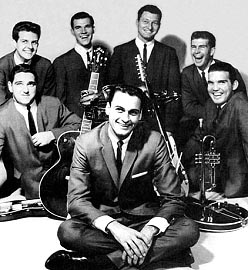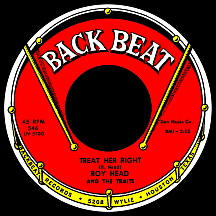ROY HEAD AND THE TRAITS
Treat Her Right
Two high school students in San Marcos, Texas (north of San Antonio) started a band called The Treys but changed soon after to The Traits, a name they used for many years. Rhythm guitarist Tommy Bolton and singer Roy Head (who'd moved from Three Rivers, south of San Antonio) put it together. Lead guitarist Clyde Causey was with the band a short time before George Frazier replaced him. Bassist Bill Pennington, piano pounder Dan Buie and drummer Gerry Gibson made it a six-man outfit. The guys were interested in several musical styles; influences included rhythm and blues, country, Tex-Mex, swamp pop and anything else that caught their ears, giving them a sound reaching beyond their specific South Texas locale. Debut single "One More Time," in 1958, had a swampy sound and was released on Bob Tanner's TNT label. '59 follow-up "Live it Up" had a straight rock and roll feel.
Five TNT singles had been released by 1961, then band members began to drift away. A new group was formed around holdovers Head and Gibson; saxophonists David McCumber and Danny Gomez were added and the group's style shifted a bit from countrified rock to something more soulful. Two singles came out on Renner, another local label, including a remake of Ray Sharpe's 1959 hit "Linda Lu" (retitled "Linda Lou"), so rapidly-paced the horns could barely keep up; a reissue some months later on the larger Ascot label didn't help its chances of getting airplay. A female singer, Sarah Fulcher, added some sauciness to "Get Back," a Jimmy McCracklin song. It appeared on Lori, a Houston-based label, as Roy - Sarah and the Traits.
The band began working with Louisiana-based producer Huey P. Meaux (known as "The Crazy Cajun," which he used as the name of his publishing company). The music biz entrepreneur had started his career producing Jivin' Gene's 1959 hit "Breaking Up is Hard To Do" and had further success with Barbara Lynn, Joe Barry, Sunny and the Sunglows and The Sir Douglas Quintet, all from Texas or Louisiana. The mostly-new lineup of Traits with its brass-enhanced sound continued haunting Texas venues, a few musicians came and went, and another small company showed interest; this time a major hit would result.
Back Beat Records got off to a solid start in 1957 and scored an early hit with "So Tough" by vocal group The Casuals of Dallas; releasing around a half dozen singles each year, the label had its biggest success with Joe Hinton, whose soulful take on Willie Nelson's "Funny" was a number one R&B hit in 1964. Near the end of that same year, Roy Head and the Traits were given a shot. "Pain" was the first of eight singles on Back Beat, but like earlier attempts it too failed and Roy began recording, separately from the band, for Scepter Records. After seven years it might have seemed that a hit was not in the cards. for them, but the second Back Beat single unexpectedly shot to the top...almost. "Treat Her Right" was high-energy, horn-blastin' party music with a precise message from vocalist Head: 'She's gonna love you tonight, now...if you just treat her right, now,' adding the guarantee, "If you practice my method just as hard as you can...you're gonna get a reputation as a lovin' man!' In the fall of 1965, Roy made numerous appearances on teen dance shows national and local, showing off the best dance moves this side of James Brown: fast footwork, splits, mic juggling and enough swagger to cover the entire southwestern U.S.

The record debuted on the charts at the start of September, moving quickly as electrical impulses do. It went top ten the first week of October and spent two weeks later that month in the number two position, held from the top by a seemingly immovable force, The Beatles' mega-smash "Yesterday." Timing can be a drag sometimes. Wolfman Jack, broadcasting on XERB, the high-powered "Mighty 1090" with transmitters in Mexico, took his own berserk approach to playing the record, shouting "One more time!" over the song's abrupt ending, repeating Roy's walloping final 40 seconds while adding his own wolf howls, then doing it again, two or three times, sometimes doubling the song's two minute length. Wolfman, you were the man!
Head's success with "Treat Her Right" prompted Scepter to promote the similarly spirited "Just a Little Bit" (first heard in 1960 by Rosco Gordon), which hit the top 40 in December; Back Beat follow-up "Apple of My Eye" landed in the top 40 a couple of weeks later. Three hits in as many months! The long wait had paid off, but the fall from grace happened just as quickly...and commenced immediately. Scepter rereleased the two-year old recording of "Get Back" (without bothering to credit Sarah Fulcher's vocal contribution) while Back Beat came with a remake of Little Walter's "My Babe," the last single to credit the Traits. Each had a short chart run in early 1966.
Roy and the Traits split for good that year. Head forged ahead with Gibson, guitarist David "Hawk" Koon and bassist Gene Kurtz, "Wigglin' and Gigglin'" on a spring single, followed by a final Back Beat charter in September, a typically un-Traits-like ballad (with strings!) penned by Les Reed and Peter Callandar, "To Make a Big Man Cry." The Traits continued with lead singer Dean Scott and managed one chart appearance of their own on Scepter, "Harlem Shuffle," in November (three years behind the original by Bob and Earl). Beaumont, Texas-born blues-rock guitarist Johnny Winter, one of the two most successful albino musicians in history (his brother Edgar Winter the other), did a stint with the band around this time.
In the early '70s, Roy hooked up with Steve Cropper of Booker T. and the MG's. Cropper produced "Puff of Smoke," a song he had written with Sir Mack Rice, and it put Roy on the charts for the first time in almost five years...though only for one week. By mid-decade, he had reinvented himself as a country act, and though fans of his early work wouldn't have guessed it was the same guy, it led to a more lucrative period for the singer than any thus far. Two dozen singles hit the country charts between 1974 and 1985, including "The Most Wanted Woman in Town" in '75 and his biggest country hit, "Come To Me," in '77. Roy Head had abandoned his rock roots and given in to sappy sentimentality (an unfortunate mainstay of '70s-era pop and country music), but it kept his career running on a consistent, successful level for many years.


